Essential oils are at the heart of aromatherapy . An essential oil is a concentrate of aromatic molecules obtained by steam distillation. They are widely used in organic cosmetics. And for good reason:one drop can give all its power to a lotion, a shower gel or a treatment. Highly concentrated in active ingredients , you have to know how to dose them correctly and be well informed before using them.
We suggest you go into a little more detail to discover the power of essential oils!
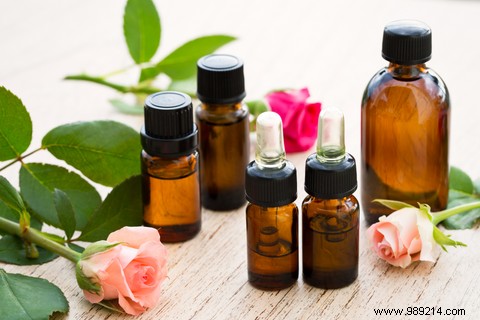
Essential oils have been used for their virtues for centuries! Already in Antiquity, people used them to treat and disinfect their wounds. They are now used in cosmetics but also in perfumery and household products . They are also known to have medicinal properties. Antiseptic, antibacterial, anti-infectious and healing, essential oils are full of power.
Be aware that the process to obtain a quality essential oil is quite long and that there are several! It is necessary to select the plant parts to be distilled (leaf, plant or bark) and place them in large tanks that will allow the water vapor to pass through them. The water vapor will release the aromatic molecules from the plants, then it will be cooled to return to the liquid state. Essential oils being hydrophobic, they will remain on the surface of the water. They can then be retrieved more easily. Once separated, the water is no longer just water, it is loaded with perfume and has become a hydrosol or floral water. This process can take several hours.
Essence, unlike essential oil, is obtained by cold pressing. It is an extraction method reserved for citrus fruits (orange, lemon, bergamot, etc.) whose aromatic molecules are found in the zest. Citrus essences are photosensitizing. Exposure to the sun after use is strongly discouraged. The essences are also more “fragile”, it is advisable to keep them in the refrigerator and not more than two years. Conversely, if an essential oil is protected from heat, humidity and light, it can be kept for up to four years.
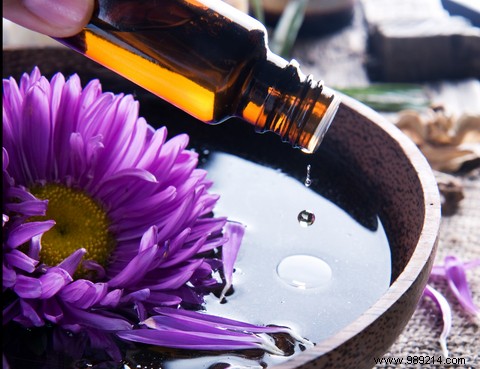
In general, choose organic labeled cosmetics guarantees you quality raw materials and respect for the environment and people. When it comes to essential oils, it is even more important to know where the raw materials come from. An organic essential oil will be made from plants from organic farming therefore without fertilizers, pesticides and chemicals. Knowing that the process of creating an essential oil is to extract the aromatic molecules of a plant, it is better to know that it is as natural as possible!
To go further, you can also choose artisanally produced essential oils. Since manufacturers have to respect a production rate, the processes are accelerated and the end products of lower quality.
Make sure your product label contains:
Essential oils can be used in many fields:cosmetics, household products, medicine or well-being.
First of all, we must not forget that essential oils are concentrates of active ingredients and that therefore we must respect the dosages and contraindications . Some essential oils are not recommended for pregnant women, children under 6, people with sensitive skin or even asthmatics. Always make sure you are well informed before each use.
In cosmetics you can use pure essential oils on the skin but be careful, this is not valid for all essential oils! Avoid doing it with cinnamon, thyme or even lemon. On the other hand, you can apply pure tea tree essential oil to a stubborn pimple. For a superficial burn, try spike lavender essential oil. Its pain-relieving and healing qualities will be welcome!
WARNING:before each use of an essential oil, pure or not, a test is carried out by placing a drop on the inside of the elbow. If no reaction occurs in the following days, you can use it without any problem.
On our online store of organic and natural cosmetics you will also find products that contain essential oils. For example, we find mint essential oil in Pachamamaï's Pure solid shampoo. It is used for its fragrance but also for its stimulating, purifying and soothing properties. In Huilette Night, we find carrot essential oil, known for its unifying properties.
You can also use essential oils to create your own shampoos or treatments. Several recipes are available on the internet, you just have to follow the dosages and you're done!
Also think about the steam bath, it brings comfort to all skin types. Boil some water and then pour it into a bowl. Put your head on top and cover with a towel, stay there for a few minutes and enjoy! Regarding the choice of essential oils:oily skin, turn to essential oil of rosewood or eucalyptus to reduce excess sebum and blackheads. For dry skin, the essential oil of lavender or chamomile is preferred. Acne-prone skin will prefer tea tree.
We use essential oils a lot in well-being because they have relaxing, stimulating and restorative properties for some. They can be used in massage oils, such as Florame relaxing massage oil which contains fine lavender essential oil. A real invitation to relax and let go. For athletes, La Nouvelle Botanique circulation massage gel is a must-have! Bourbon geranium essential oil will give you light and toned legs.
Essential oils can also be used as home fragrance through a diffuser. For a good night's sleep, we recommend a synergy of essential oil with Roman chamomile, fine lavender and bitter orange petitgrain. To purify the air in your home, try a synergy of grapefruit essential oil, ravintsara and eucalyptus globulus. Again, the possibilities are endless!
Winter is coming and colds with it? Think about inhalation! Nothing very complicated for that:boil some water and pour it into a bowl, add to it
Essential oils can also help you disinfect your work surface or to make a laundry . We can turn to an essential oil that we like for its smell or for its various and varied qualities. Do not forget to respect the dosages when mixing.
As you will have understood, each oil has different qualities to offer. This is what allows everyone to find what they are looking for, whether in cosmetics, well-being or household products. Focus on the most used essential oils.
Tea tree essential oil comes from the leaves of the tea tree, it is obtained by distillation. Its main properties are
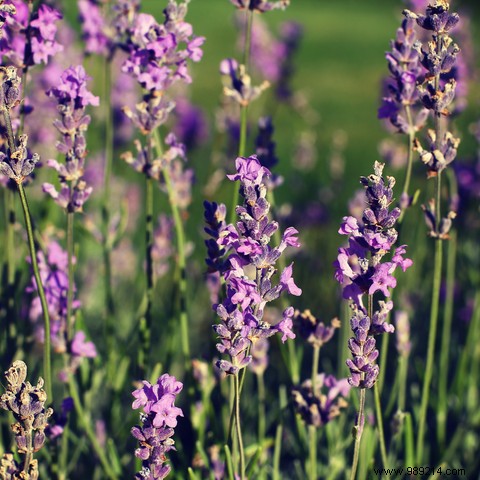
Not to be confused with aspic lavender or lavandin. Fine lavender (or true lavender) essential oil comes from the flowering part of the plant and is obtained by distillation. It is mainly known for its properties
Peppermint essential oil is obtained by distilling the leaves and flowering parts of the plant. It is not recommended to apply it pure on the skin because it contains menthol which is very irritating. It is recognized for its virtues:
This essential oil is made for letting go ! It is known for its antispasmodic powers (to fight against muscle spasms) and is very useful for nervous problems (sleep problem, anxiety, stress, etc.). It is also used on scars or acne-prone skin. It is obtained by distillation of the leaves of the tree.
Without medical advice, petitgrain bigarade essential oil is not recommended for pregnant and breastfeeding women, children under 6 years old and people with sensitive skin. Also avoid contact with eyes or mucous membranes. After application, take care not to expose yourself to the sun, photosensitizing essential oil.
Lemon essential oil, or essence, is obtained by pressing the zest. It is this same oil that was used by sailors in the 18th century to fight against scurvy. Lemon essence is very precious, it takes about 3000 lemons, or almost 300 kilos of zest, to produce 1 kilo! This essence is highly valued for
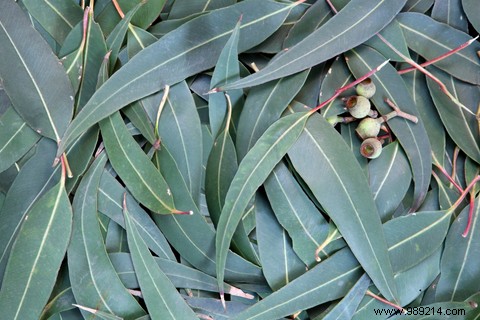
Eucalyptus radiata essential oil is obtained by distilling the leaves of the tree. It was widely used by the peoples of Australia to treat wounds and persistent fevers. It is used for respiratory infections and to strengthen the immune system.
It is not recommended for pregnant and breastfeeding women, sensitive skin and people with asthma. Do not use pure on the skin or on children under 12 years old.
Eucalyptus Globulus essential oil was once used in sick rooms to purify the air. Today, it is used to declutter the respiratory system in winter or to clean the air in a room. It is not recommended for pregnant and breastfeeding women and for children under 12.
Ravintsara, which means “good leaf” in Malagasy, is native to Asia. Antibacterial and antiviral, it is the essential oil to have during the winter period. He is credited with many powers:
Bourbon geranium essential oil is also very precious. To produce 1.5 kilos of essential oil, you have to use close to a ton of plants! This plant is widely used in perfumery for its sweet and flowery smell. In cosmetics, it is a skin booster ! It makes it brighter, prevents skin aging, suitable for oily skin as well as dry skin. Combined with lemon, diffused or applied to clothes, it is also very useful to keep insects away.
Without medical advice, essential oil of geranium bourbon is not recommended for pregnant and breastfeeding women, children under 6 years old and people with sensitive skin. Also avoid contact with eyes or mucous membranes.
To obtain Niaouli essential oil, the leaves of the Niaouli tree are distilled. It can be used in children from 6 years old in dilution in a bath for example. It offers mainly antibacterial properties but is also appreciated for
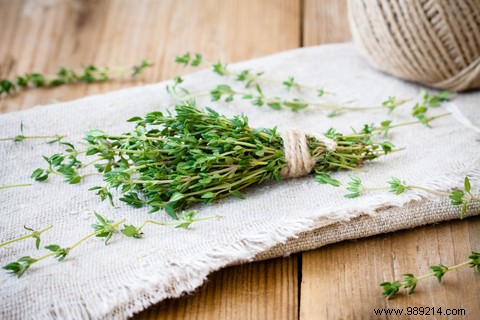
Another winter essential, thyme essential oil is an ally against colds, stuffy nose and fatigue. It is antiviral and immunostimulant.
It is also used to reduce hair loss, strengthen it and fight dandruff. To be used diluted on the skin.
Without medical advice, thyme essential oil is not recommended for pregnant and breastfeeding women. Also avoid contact with eyes or mucous membranes.
Essential oils are concentrates of very useful active ingredients. They can be used in different areas and mixed to get the most out of them.
Remember to always seek medical advice before use . All essential oils are not to be used in the same way (pure or diluted, oral route, dermal route, etc.). Some are recommended to reduce nausea during the first months of pregnancy, while others are to be avoided during the nine months!
Our advice? Find out and read the contraindications and don't forget to test them on the inside of your elbow before use.